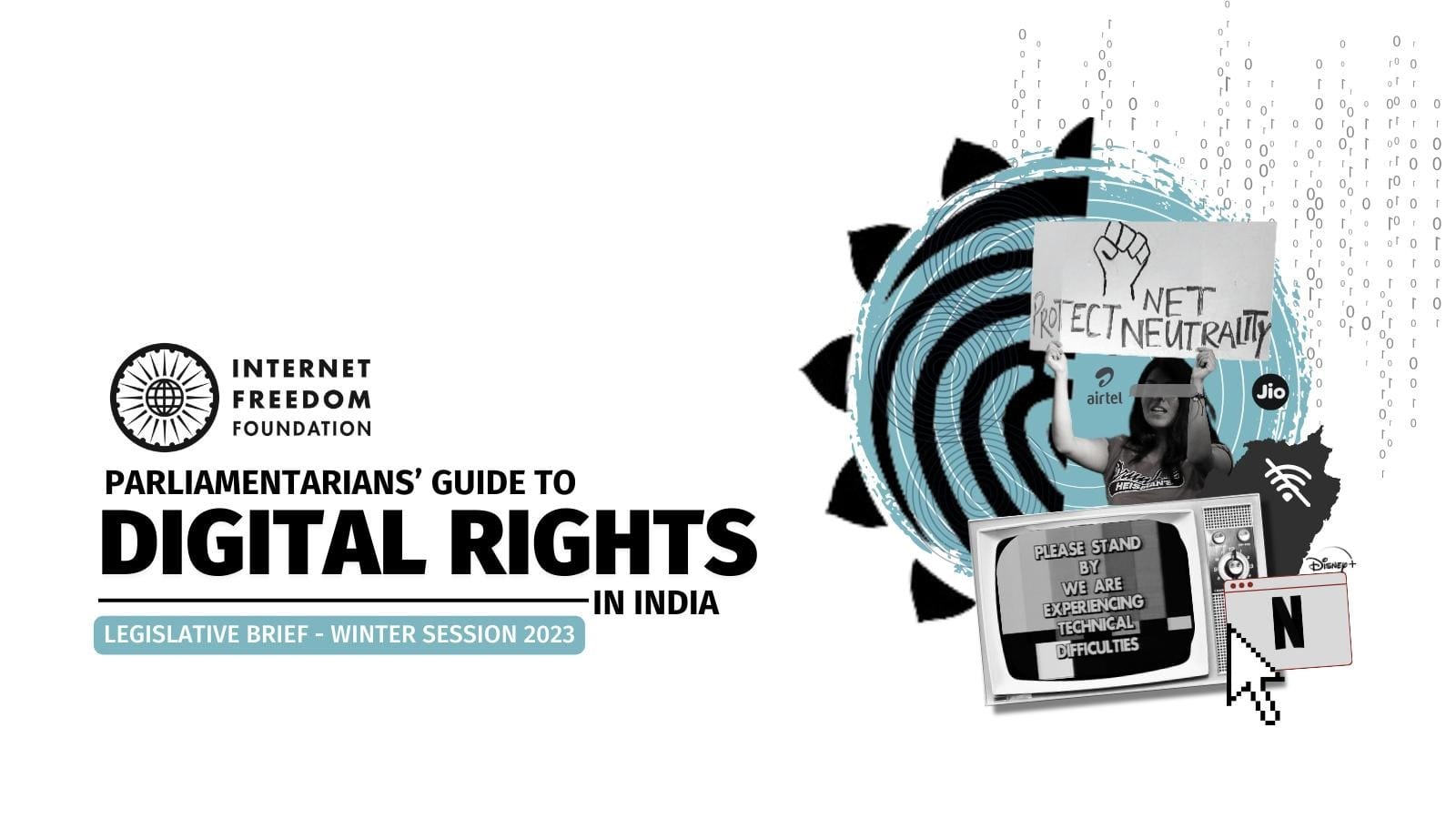
tl;dr
We are pleased to share our legislative brief on digital rights for the Winter Session 2023 of the Indian Parliament – a round-up of digital rights issues for parliamentarians to consider as the session convenes on Monday, December 04, 2023. In the brief, we highlight key areas of concern in the domains of digital and freedoms rights, data privacy, data protection, censorship, and adjacent concerns, that require extensive deliberation in both houses of the Parliament.
Introduction
The Winter Session of the Indian Parliament will commence on December 04, 2023 and is expected to conclude on December 22, 2023 as per a press release from the Ministry of Parliamentary Affairs. A total of 18 bills have been listed for consideration, which includes the three new criminal law bills which were referred to the Parliamentary Standing Committee on Home Affairs for review and recommendations in the previous session.
The previous session of the parliament was adjourned sine die on August 11 after sitting for a total of 17 days. A total of 23 bills got the assent of Parliament without proper and meaningful discussion on legislation of paramount importance – the Digital Personal Data Protection Act, 2023, Registration of Births and Deaths (Amendment) Act, 2023, Cinematography (Amendment) Act, 2023 and the Press and Registration of Periodicals Bill, 2023 were all worryingly passed without due consideration to their cataclysmic effect on digital rights and freedoms. Read our Digital Rights Review of the monsoon session here. Both houses also saw low rates of productivity: Lok Sabha sat for only 43% of the allocated time and Rajya Sabha for 55%.
Potential issues to be deliberated upon in the upcoming session
- Digital Personal Data Protection Act, 2023 fails on key safeguards: India’s umbrella data protection legislation, the Digital Personal Data Protection Act, 2023, was disappointingly passed without adequate public consultation or due consideration to parliamentary rules and procedure. The Act has several deficiencies, such as weak notice requirements for data sharing, storage or transfer, and allows for processing of data without consent “certain legitimate uses” which are left inadequately defined. In fact, the Act is replete with vague or indefinite provisions and, at many instances, leaves implementation of provisions up to rules that will be notified later. The IT Union Minister, Ashwini Vaishnaw, stated that all 25 draft rules for the Act will be placed in the public domain for public consultation for approximately 45 days, which may prove to be inadequate.
- Criminal law reform through three new Bills: Three bills overhauling current Indian criminal laws were introduced in the 2023 monsoon session, and referred to the Parliamentary Standing Committee on Home Affairs for review and recommendations. The bills digitise most aspects of criminal procedure, and include ‘digital evidence’ under the ambit of the evidence law, without outlining a clear chain of custody for such evidence or securing it against leaks, breaches or tampering. Though the word ‘sedition’ has been deleted from the law, the concept is retained through vague provisions penalising ‘acts endangering the sovereignty, unity, and integrity of India’. The new language additionally leaves room for arbitrary application. The review and recommendations of the Parliamentary Committee, spanning 10-28 pages in 250-530 page reports, do not adequately address the provisions of the bills affecting individual privacy, digital rights, and fundamental freedoms.
- The Draft Telecommunication Bill retains a colonial approach: The draft Indian Telecommunication Bill, 2022 replicates language and choices used by the colonial Telegraph Act, 1885 and introduces provisions that may undermine constitutional rights and innovation in the digital sector. It retains an antiquated approach reminiscent of the draconian Telegraph Act, 1885, enables overbroad surveillance without accountability or oversight, and empowers the DoT to suspend internet services without establishing procedural safeguards. The Bill undermines user privacy by suggesting an onerous KYC process, and user autonomy by penalising the use of unlicensed telecom providers. Overall, the Bill is incongruent with the principles of net neutrality.
- Unfounded attempts to regulate the the “OTT” Communication Services space: The Telecom Regulatory Authority of India (TRAI) released the consultation paper on ‘Regulatory Mechanism for Over-The-Top (OTT) Communication Services, and Selective Banning of OTT Services’ on July 07, 2023. The attempts made to define and classify “OTT” services are unfounded as any such efforts will be unable to reflect the complexity arising from the multiple functions they perform. The consultation paper also poses the suggestion to selectively ban internet applications and services, the application of which will be ad-hoc, non-transparent, ambiguous, infeasible, and impractical, and it may have negative consequences on user choice and freedom.
- Denial of human rights through internet shutdowns in Manipur: On November 23, 2023, the internet shutdown in Manipur crossed 200 days. A vast majority of its residents remain without any access to the internet. The arbitrary suspension of internet and telecom services, levied and lifted on disproportionate terms and conditions, do not adhere to the doctrine of proportionality propounded by the Supreme Court in Anuradha Bhasin v. Union of India. Access to healthcare, education, banking facilities, livelihood, and government welfare schemes remains impeded. Workers dependent on rural employment guarantee schemes have lost wages due to not being able to mark their attendance on a government app due to internet suspension. The state-wide denial of human rights through an indefinite internet shutdown is a pressing matter of concern.
- A misguided draft Broadcasting Regulation Bill: The Ministry of Information and Broadcasting (“MIB”) released the Broadcasting Services (Regulation) Bill, 2023 (“Broadcasting Bill”) for public consultation on November 10. The draft bill includes “Over-the-Top” (“OTT”) content & digital news published by individuals under the regulatory ambit raising concerns for online free speech and journalistic freedom. Exerting executive control over “OTT” content will lead to over-compliance and self-censorship on part of platforms, who will be keen to avoid the wide discretion allowed to the government when it comes to punishments.
- Upcoming “Digital India Act” must be rooted in constitutional principles: The upcoming legal framework, “Digital India Act” or “DIA” will overhaul the Information Technology Act, 2000. News reports have revealed that the legislation will “govern the digital space on key issues such as online harm, de-platforming, doxxing, and social media algorithms”, in addition to a prospective list of the types of content that may be regulated. The Ministry has held two meetings in the months of March and May on the upcoming DIA. Among the more contentious aspects raised was the potential removal of the ‘safe harbour’ clause for intermediaries. To ensure that any draft “DIA” is reflective of the recent developments in the digital ecosystem, the existing lacunae and inadequacies in the IT Act, 2000 must be subject to significant scrutiny from diverse perspectives. Further, the new digital legal framework must be based on constitutional principles, enshrining constitutionally guaranteed fundamental rights.
- Social impact of emerging technologies: State and union governments are deploying artificial intelligence (“AI”) on a large scale across sectors, spanning uses in urban administration, policing, surveillance, and welfare service delivery, to name a few. The deployment manifestly lacks transparency. State and union governments often do not make public the accuracy assessment processes or reports of the technologies they use across sectors. They do not reveal adequate information about the usage in the press releases or tenders. Research recommends that artificial intelligence, in its present form, should not be used in welfare service delivery as the datasets are often not free from bias. The manner of rapid and opaque deployment of AI in public sectors suggests that state and union governments may be using emerging technologies as “snake oil”, where an increasing number of interventions are being labelled “AI-powered” without evidence. Additionally, some government initiatives such as using AI to detect distress on people’s faces or fatigue in drivers’ eyes, are not based in science, as AI globally does not yet possess the ability to do so. At this stage, the use of emerging technologies in the public sector must stop or, at the least, be severely restricted, especially in the absence of research and understanding on AI technology.
There’s this and much more in our Legislative Brief
This is a sneak peek at some of the issues we have covered in-depth in our brief, including data on telecom and internet connectivity; statistics on implementation of schemes; details on key areas of digital governance such as public consultations, privacy and data protection, free speech, access to internet, and surveillance. For more analysis, statistics, and insight into future legislative developments related to digital rights, see here!


